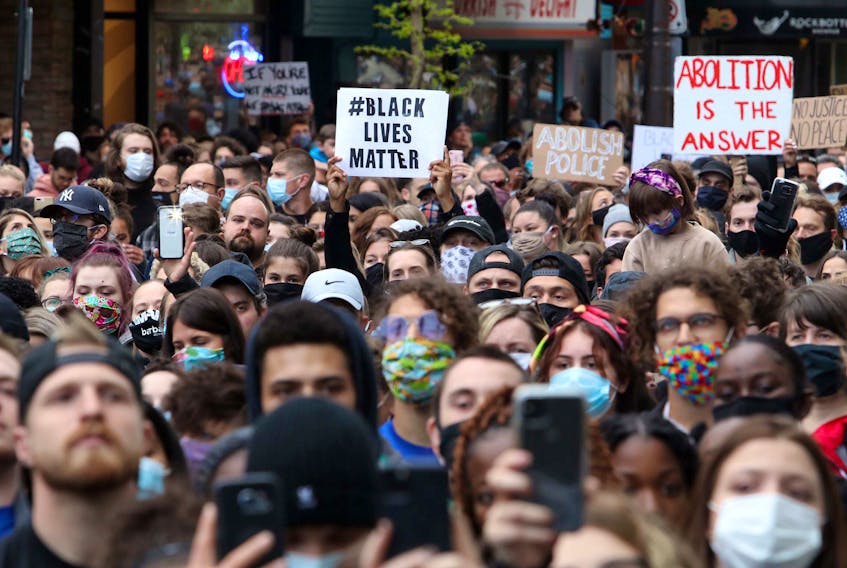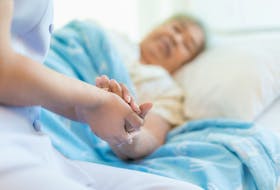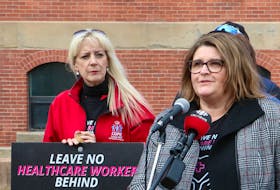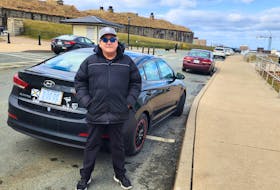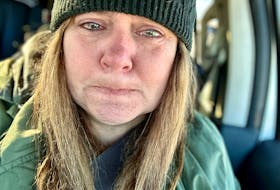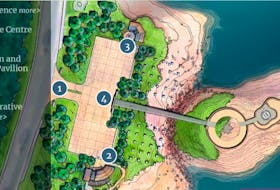I wasn’t at the big rally in Halifax on Monday, like thousands of you were, so I’m going by word-of-mouth, pictures and video.
But maybe I’ve seen and heard enough to hope that the scene on Spring Garden Road, which we know has been repeated in countless cities across the United States, Canada and the world, will be one that reverberates through time.
Nothing will make us forget the nightmare of the past few days: the slow-motion strangulation of George Floyd, the ensuing riots and stormtrooper police wreaking chaos on street after American street, Donald Trump, alternatively cowering in the White House then, after the pepperspraying of protesters, emerging to stand before a church, clutching a bible like a paunchy, scowling Zarathustra.
But on Monday there wasn’t a punch thrown, a shop window broken, or a protester concussed by a police baton as the people of Halifax, by some estimates half of them nonblack, stood, for the most part, a safe distance apart.
Then, as one, they took a knee, just as they did yesterday in London, Washington, Copenhagen and Amsterdam, to observe a moment of silence for black people everywhere who have unjustly lost their lives.
“It’s epic and monumental that y’all white people came out,” Rodney Small, the director of the One North End Community Economic Development Society, told me afterward.
After being accused of assaulting a Halifax police officer at age 15 he waged a four-year court battle before being vindicated by the Supreme Court of Canada.
“Halifax definitely stood up” at the rally, he said.
Black people have undergone centuries of exploitation “in a capitalistic race-based society that we have never been given a chance to take part in,” he added.
But the symbolism of Monday’s event, with its coming together of peoples, “will be felt many generations from now when that little girl on her dad’s shoulder is living in a society that allows her to make equitable decisions.”
When I asked Irvine Carvery, an older generation of black activist, about the whole event he called it “the continuation of half a century of protest by people in resistance.”
Age and a number of underlying health issues mean that, in the time of the pandemic, crowds are anathema to Carvery. So, like me, he knows what he knows about the protest from second-hand sources.
But he, too, was happy to see so many white faces join in the rally because only they can end racism towards African Nova Scotians.
“I think that the wheels of change are turning,” Carvery added, even if, in his view the struggle to end racism is far from over, here and everywhere.
Carole Symonds, who at 20 will be in the fight for decades to come, was downtown in Halifax on Monday evening, along with her cousin and two friends, all of whom, she said, have experienced some level of police brutality.
Symonds’ expectations were limited when she arrived to take a symbolic knee at the appointed 7:45 p.m. But when the moment came, “you could hear a pin drop in the silence."
Symonds, holding her cousin’s hand, and praying for her metaphorical brothers and sisters, felt the deep power of the occasion.
Standing in front of Park Lane mall she heard her cousin, Derico Symonds, who has led peaceful protests calling on Halifax Regional Police to ban street checks after a 2019 report stated that blacks are six times as likely as whites to be stopped by Halifax police, say that the rally showed Halifax is paying attention to racism, even if that’s only the start.
Then she joined the chant, begun by her cousin, calling for “no more” deaths like George Floyd’s.
So, she noticed, did the white folks, for so long her people’s oppressors, now carrying signs of support, and, seemingly, acting as allies.
“No one could tell me that my God wasn’t there that day,” Symonds said, sure that Monday’s gathering was “a new beginning” and “a day my people will remember forever.”
I hope that she, Carvery, and Small are right.
I hope that in the future we will look back and say that the world experienced a seismic shift after the terrible events of last week.
And that historians will conclude that a spark, lit in hundreds of individual rallies like the one in Halifax, fed the flame of change.
I hope for something else too. That people like me have seen the light.
That the event in downtown Halifax shows that white people finally have some semblance of understanding of what the residents of Africville, and their descendants, mean when they say that the pain from the razing of their historic community is as fresh as if it happened yesterday.
That we, at last, get the anger of black men and women consistently pulled over by the police.
That, though there is no way we can ever know what it feels like, we at least have awoken to the injustices that so many of our fellow citizens endure every waking day.
That we finally understand that our indifference has caused so much pain — and must never forget what Irvine Carvery said: that after being the problem for so long only we can be the solution

